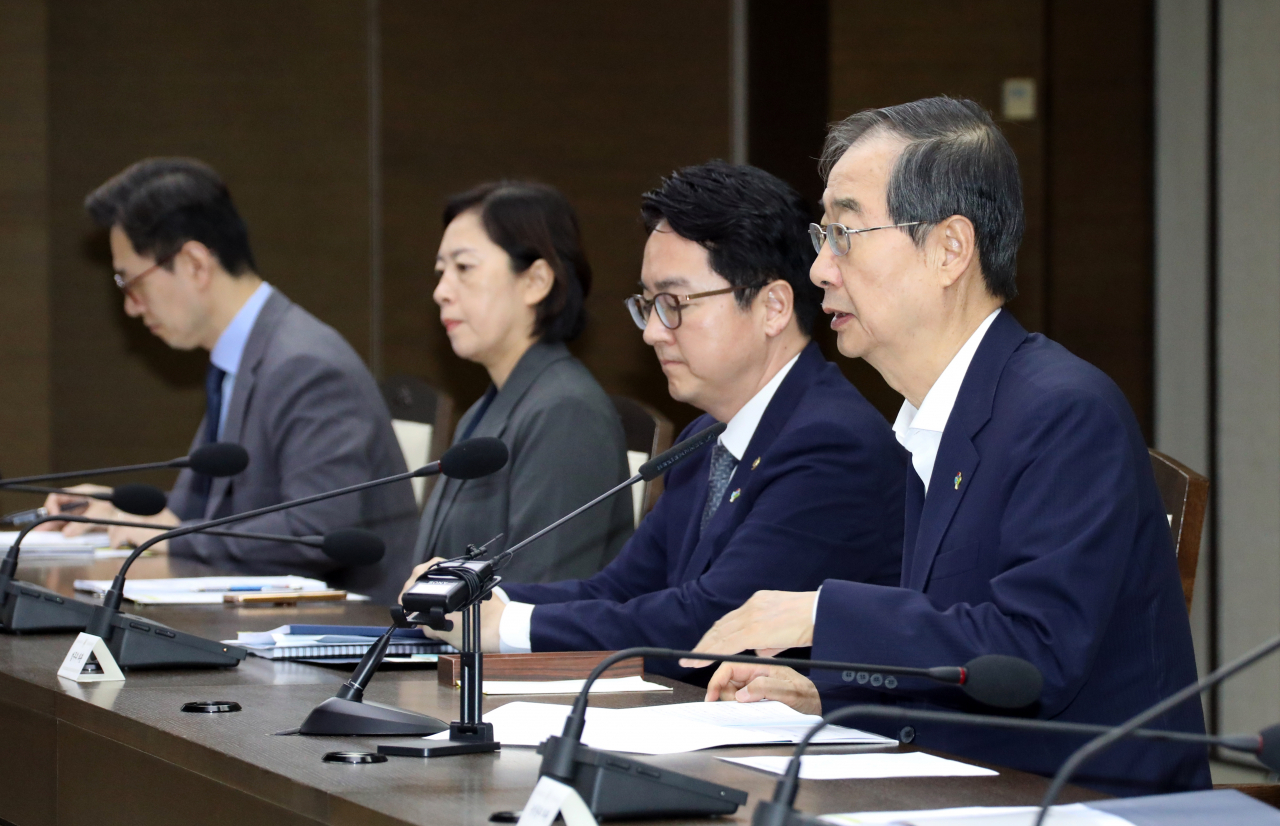 |
Prime Minister Han Duck-soo, first from right, presides over a ministerial level meeting held at Government Complex Sejong on Thursday. (Yonhap) |
South Korea seeks to adopt plans that will make it easier for its some 163,000 international students to live and work here, including expanding the visa types and job options offered to them, officials said Thursday.
In a bid to plug job vacancies across key industries here, the government plans to allow foreign students who graduate in Korea to apply for E-9 nonprofessional employment visas, according to the Office for Government Policy Coordination and Prime Minister’s Secretariat.
The announcement came as a result of a meeting of government agencies overseeing immigration and visa agendas, presided over by Prime Minister Han Duck-soo held at the central administrative city of Sejong.
Currently, foreign students who graduate here are only eligible for a limited number of visas, such as the E-7, which is issued for a limited number of specialist job types.
The length of stay for D-10 visa holders, who are seeking jobs upon completing their university programs here will be extended to a maximum of three years. Currently, D-10 visa holders are allowed an initial six-month stay and can extend the term up to two years.
For students seeking jobs in the shipbuilding sector, which faces a chronic labor shortage, the government aims to help them get hired immediately after completing certain training programs.
Companies will be able to fill vacancies created by employees going on maternity or paternity leave with students as well.
In addition to the measures for students, the government plans to widen E-9 and E-10 visa holders' access to E-7-4 visas, which provide more flexibility in employment and allow holders to stay in the country longer. Criteria for the conversion, which includes the applicant's level of education, assets and certifications, will be eased and the quota for the number of visas issued will be increased.
The parents of foreign students will be eligible to apply for an E-8 seasonal workers visa to allow families to live together.
To increase efficiency in handling the task of catering to foreign students and workers here, the government will launch a special committee of officials in July. Different agencies currently handle workers with different visas, with the Ministry of Justice catering to E-8 seasonal workers and the Labor Ministry overseeing workers on E-9 and H-2 visas, which are issued for mostly manual jobs with relatively low formal skills requirements. The committee will allow the government to get a more comprehensive insight into the matter, the prime minister’s office noted.
"We seek to combine the management responsibilities for foreign workers that have been divided among ministries until now, and strengthen connections and adjustments among foreigner policies," Han said during the meeting.
“We must actively encourage diligent foreign workers to fill job vacancies here, which is why we have decided to come up with an effective management system amid an increase in demand for foreign workers,” he added.
The plans are in their early stages of development and will be adopted by the end of next year, officials explained.
There are currently around 560,000 people in the country on work visas, and the prime minister said the number was expected to grow further.
The latest announcement comes as the Yoon Suk Yeol administration seeks to increase the foreign workforce to combat labor shortages caused by a declining and aging population.
South Korea is suffering a population crisis, with the general population aging and fewer people giving birth. South Korea's fertility rate -- the number of children a woman has in her lifetime -- came to 0.72 in 2023, making Korea the only member of the Organization for Economic Cooperation and Development with a rate below 1.







![[Today’s K-pop] Blackpink’s Jennie, Lisa invited to Coachella as solo acts](http://res.heraldm.com/phpwas/restmb_idxmake.php?idx=644&simg=/content/image/2024/11/21/20241121050099_0.jpg)